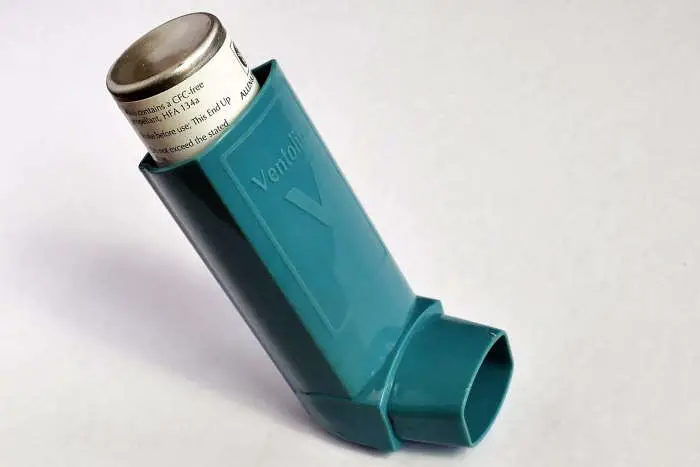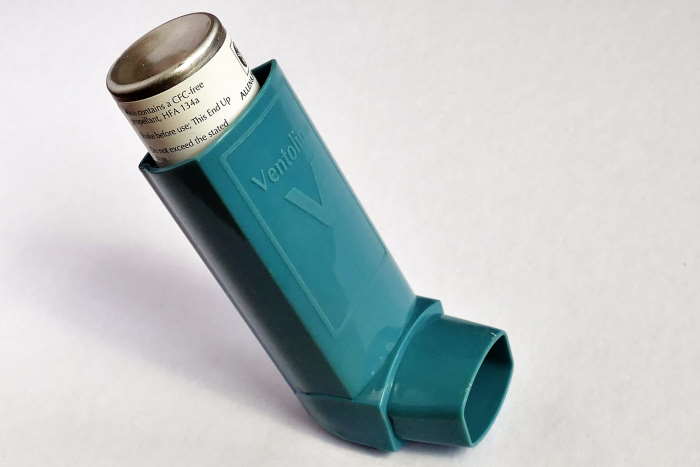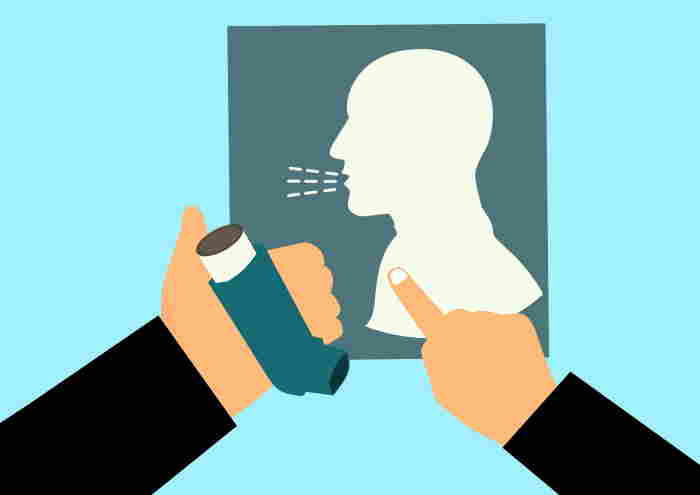- You are here:
- Home »
- Blog »
- Dive Deeper »
- Freediving and Asthma – Can they mix?
Freediving and Asthma – Can they mix?


At one time, asthma was considered to be a significant contraindication to diving of any type. However, now that the condition is better understood, medical professionals have started to permit some people with asthma to consider diving, including freediving.
[Disclaimer: This post is not medical advice nor is the writer a qualified medical practitioner. I recommend consulting a licenced physician before undertaking freediving if you have asthma].
People with moderate or mild asthma can freedive as long as they see a diving physician and take extra precautions before diving. However, they will need to be conscious of their condition at all times and be ready to react in the case of an asthma attack.
So, let’s talk about freediving with asthma and what it takes to do so safely. I’ll let you know the risks and give you some tips that will help you get ready to freedive with asthma.
Can You Freedive if You Have Asthma?
It may seem like freediving is impossible for you if you have asthma. However, plenty of people with lung problems can still dive deep without any issues.
You can freedive if you have asthma as long as it is under control and you have clearance from a doctor with experience treating freedivers. Freediving with asthma shouldn’t be an issue, but it depends on the severity of your condition, so getting checked out by a doctor first is a must.
Asthma appears differently in all people, so some people might have more issues with freediving than others.
For example, if you’re someone whose asthma acts up when you exercise or are in stressful situations, you’ll likely have a more challenging time training your breath for freediving than people who have allergen-related asthma.
The most crucial step in understanding whether your asthma will interfere with your freediving is to see a doctor who specializes in diving.
Dive medics and doctors have training in certifying people with various medical conditions in diving, so their advice will help you understand how your asthma could affect your driving performance.
Usually, these physicians will approve you for diving if you:
- Have a mild or moderate case of asthma and don’t require a rescue inhaler.
- Complete a Fitness to Dive Evaluation, including Pulmonary Function Testing (PFT) and a high-resolution spiral CT scan.
- Have normal spirometry test results.
- Pass a bronchial provocation challenge.
- Don’t have cold-, exercise-, or emotion-induced asthma.
If you want to find a good diving doctor, you may want to look into the Divers Alert Network’s Physician Referral Network, which helps you get in contact with a dive physician in your area.
Furthermore, they’ll promptly answer any questions you have about your medical conditions and diving free of charge. I highly recommend reaching out to them if you have any concerns about your health and diving.
The Challenges of Diving with Asthma
If you have asthma and want to freedive, you’ll need to be prepared for the worst-case scenario. That way, if something does happen, you won’t panic, and you’ll be able to surface before things become truly dangerous.
The two things may go wrong when you freedive with asthma:
- You could have bronchospasms or an asthma attack underwater.
- The excess mucus in your lungs could put you at additional risk for barotrauma.
So, what does that mean for you? Let’s talk about these risks in more detail so that you can understand how asthma might put you at risk for diving complications.
You Could Have a Bronchospasm or Asthma Attack Underwater
Having an asthma attack underwater is far from ideal, but it could quickly happen if you overexert yourself or are exposed to one of your triggers.
That’s why many medical professionals recommend that people with cold-induced or exercise-induced asthma avoid diving. It’s also important not to dive if you have had to use your inhaler within 48 hours of the dive since you may be at risk for another attack.
Excess Mucus and Constricted Airways Puts You at Risk for Barotrauma
As you dive, the pressure underwater increases rapidly, compressing the cavities in your body. Likewise, when you ascend, the gases and liquids in your body redistribute as the pressure decreases.
When you have excess mucus buildup from asthma, the compression of your lungs and sinus cavity could interfere with how you respond to the water’s pressure.
If you have too much mucus in your lungs, it’ll move up into your bronchi and trachea as you descend. That’s because diving increases the surface pressure around your body, decreasing the volume of other liquids and gases and compressing your lungs.
When you ascend, the displaced mucus that is stuck to your airways will expand, blocking your lungs from your larynx and making it difficult to exhale. When that happens, the mucus and air in your body will expand rapidly, possibly rupturing the air sacs or brachia in your lungs.
In addition, asthmatics usually have narrower airways than people without asthma, resulting in the air getting trapped in their lungs.
According to the Divers Alert Network, some other injuries that could occur due to excess mucus buildup from asthma include arterial gas embolism, burst alveoli, collapsed lungs, or subcutaneous emphysema.
So, managing your mucus levels before diving is crucial if you don’t want to hurt yourself upon your ascent.
Training for Freediving with Asthma
If you have asthma and want to freedive, there are ways that you can practice and train your lungs before you even get in the water, which includes practicing breathing techniques. Not only do these help you train for freediving, but they may also help reduce your asthma symptoms.
One tried-and-true technique for alleviating asthma symptoms is pranayama breathing techniques. This same practice is used while training for breath-holding when you freedive.
Ultimately, taking control of your breathing for freediving can help you lessen your asthma symptoms and train your body for breath-holding.
Tips for Freediving With Asthma
When you have asthma, taking some precautions can keep you safe while you’re out on the water. Let’s now talk about some helpful tips for freediving with asthma.
Consult Your Doctor First
Regardless of any advice that you get from your usual physician or your diving instructors, consulting a specialized diving physician is crucial to ensure that you can safely freedive. If you have even a mild case of asthma, getting clearance from a specialist will help you understand what precautions you might need to take when you dive.
It will also help you understand what risks you’ll take when you go underwater, and your physician might have some helpful tips and tricks that could keep you from getting an injury.
Know Your Triggers
Knowing when your asthma usually acts up will help you prepare for any conditions that might trigger an attack while you’re underwater. For example, if you have allergy-induced asthma, avoid allergens before diving and blow your nose before leaving the land.
If you have weather-related asthma, only dive when the weather doesn’t worsen your symptoms.

Before diving, it’s crucial you understand what kind of triggers provoke your asthma attacks.
Stay Aware and Prepared for an Attack
When you have asthma, being aware of the risks and being prepared for complications is essential. If you have asthma, always bring a partner just in case anything goes wrong.
Before you dive, inform your group that you have asthma and keep your inhaler close.
While you’re underwater, keep your hand on the weight release in case anything happens, and try to stay calm if you feel bronchospasms coming on.
Loosen and Get Rid of Mucus
Before going underwater, loosening and expelling excess mucus can help open up the passageways in your lungs so that you don’t experience any complications during your ascent.
Here are some tips to help you loosen up the mucus that pools in your lungs and sticks to your brachia:
- Stay hydrated. Drink plenty of water starting several days before you go diving to loosen the sticky mucus that pools in your lungs.
- Practice coughing before your dive. A helpful practice for expelling and loosening the mucus in your chest is huffing out air with force as if you’re coughing. Exhale sharply from your diaphragm for several minutes, allowing the airways in your lungs to clear and open up.
- Use steam or a hot shower. The day before you dive, use a steam machine or hot shower to help you breathe in plenty of warm, humid air. This way, the mucus in your lungs will loosen and thin out.
Final Thoughts
Freediving with asthma may take some additional medical screening and precautions, but most people with moderate to mild asthma can still enjoy the thrill of diving. That said, it’s essential to always be prepared for the worst. By doing so, you’ll ensure that you stay safe even when emergencies do happen, and you’ll be able to surface as soon as possible.
About the Author Gerrie van Niekerk - Apnealogy
Gerrie is a passionate Freediver, Spearfisher, Digital Marketer, and author for the Apnealogy website. Gerrie is an SSI Level 1 certified Freediver who loves geeking out about freediving and spearfishing gear and lives for his family and adventure.

